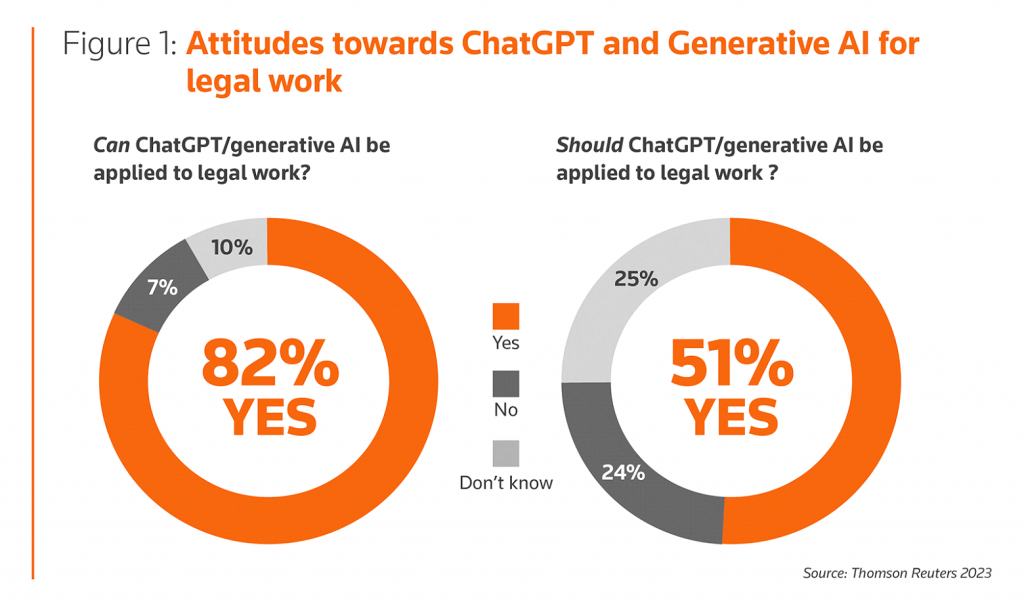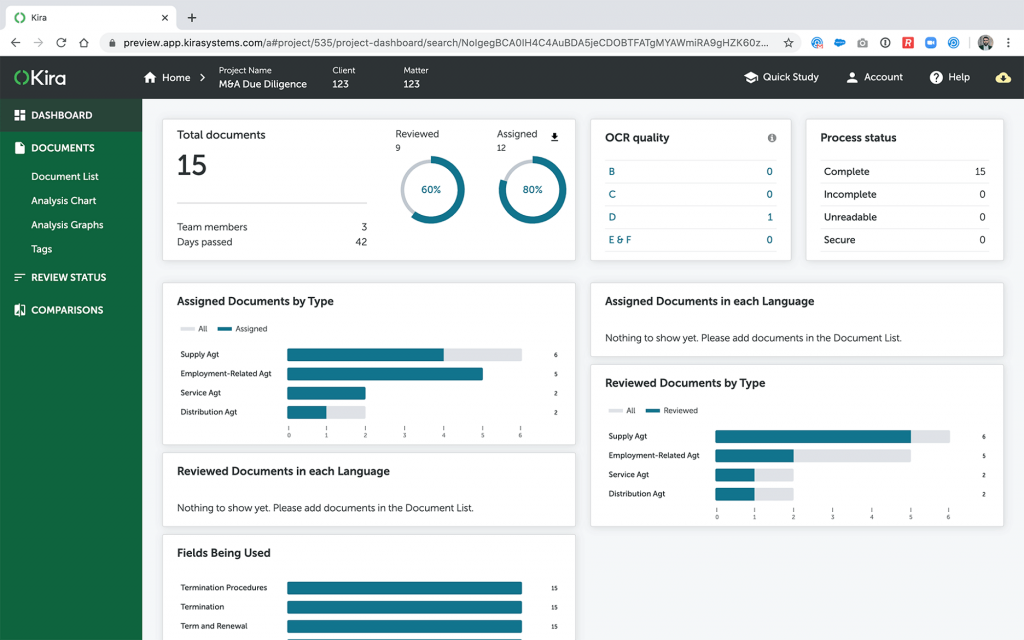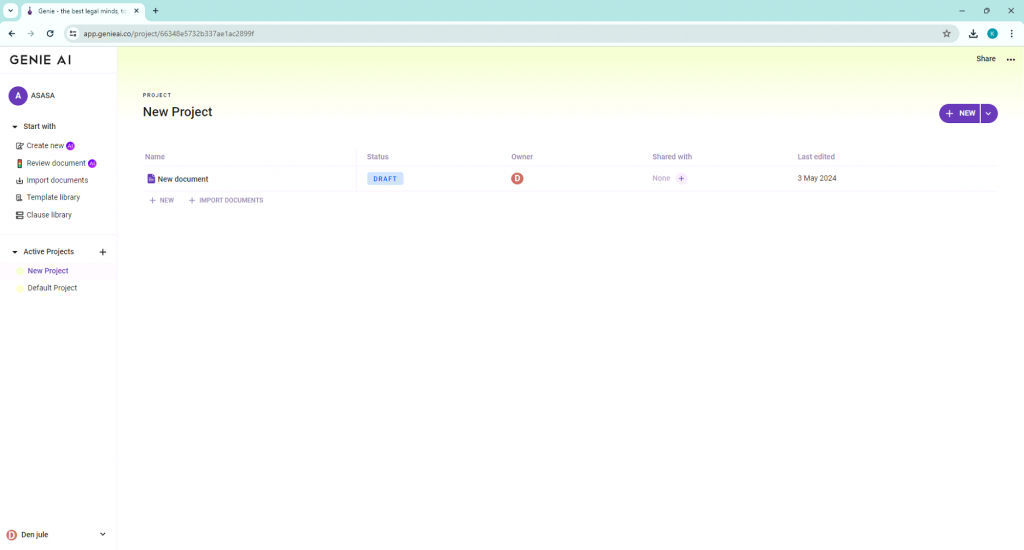Introduction to Artificial Intelligence in Law
The integration of AI in law is transforming the work of legal practitioners. Based on the survey of law firm lawyers by Thomson Reuters, 82 % believe that ChatGPT and generative AI can be applied to legal work while 51% said that ChatGPT and generative AI should be applied to legal work.

Legal professionals who are aware of AI-powered tools like ChatGPT have positive feelings about the potential use in the legal industry. Though some respondents agreed that using generative AI or ChatGPT for non-legal work such as using Chatbot for answering inquiries or administrative tasks.
As AI technology becomes more refined, its integration into legal practice is transforming how lawyers draft analyses, conduct research, and analyze cases. With its ability to interpret large amounts of data, AI is becoming a valuable tool in the modern world of legal practice.
AI Technologies in Legal Sector
The integration of AI in law is transforming the different areas of legal practice from conducting research, analyzing and reviewing data, and document automation. Here are the significant areas currently AI is transforming.
Legal Research through the use of E-Discovery
AI technologies are used by lawyers and paralegals in legal research through the use of e-discovery. E-discovery serves as a valuable tool that enables lawyers to quickly retrieve relevant law cases and other law related information. Traditionally, legal professionals used books and other documents to find relevant information. The results of e-discovery is known as electronically stored information (ESI), it is used as evidence in court proceedings or investigations.
E-discovery significantly reduces the time it takes to gather evidence. Back in 2005, when the US Supreme Court decided the Federal Rules of Civil Procedure to include electronic records that could be archived and retrieved relevant information. Lawyers can use up to date search algorithms and keywords searches to quickly find relevant information. It saves time and also ensures that no crucial evidence is missed. By utilizing this advanced technology, it is much easier for lawyers to access and review documents for legal purposes.
Document Automation
AI powered tools can reduce the time and effort needed for drafting legal documents. By the utilization of AI automated document systems, legal professionals have the opportunity to work more efficiently and allow them to focus more on crucial parts of their cases. It is essential for document review and analysis and reducing the risk of errors made by humans.
Through the utilization of AI to quickly and accurately analyze documents, by identifying key information, and pointing out potential issues or irregularity. According to the case study of Clifford Chance, he is one of the adopters of document automation. The implementation of document automation in the firm is to reduce risk and bring efficiency in the process. In addition, it allows enough for flexibility but ensures the document won’t be altered due to manual human error. It also provides various legal document templates, including letters, agreements and other legal documents. AI can also provide a wide range of templates for legal documents. These can be customized based on the clients needs and saving time and effort in drafting from scratch.
Legal Review and Analysis
AI algorithms can examine large amounts of data to predict possible outcomes. These advanced technologies can be used for legal assessments, where it can quickly analyze vast amounts of legal documents and can provide insights on some cases. Also, AI can assist lawyers in reviewing and understanding legal documents, making it easier for them to extract important information. According to Thomson Reuters Institute, an attorney’s daily responsibilities ranging from creating, reviewing legal documents and these tasks are often repetitive and vulnerable for human error. With the use of AI it can improve accuracy and thus reduce risk.
The utilization of AI has the potential to transform the way lawyers work, making the process more accurate and faster. By incorporating these technologies, law firms can stay ahead and provide better services for their clients.
Legal Advice Automation
AI powered chatbots are being used by providing their clients with immediate information and assistance to potential clients. These technologies can engage with clients to answer their questions about legal matters thereby reducing the need for lawyers to intervene until the clients need much more assistance. Through the use of AI it enhances clients interaction by resolving clients inquiries, scheduling appointments and providing basic information regarding their legal inquiries.
According to Tom Martin, founder and CEO of LawDroid, who also helps lawyers to design chatbots. Additionally, using chatbots is a great help to other people to have easy access to justice. The integration of AI in the legal sector helps lawyers and clients to have easy access to legal matters. This can lead to faster resolution of legal issues, improved decision-making and ultimately better outcomes for clients. As AI continues to advance, it is expected to transform the legal sector, leading to more innovative and improved outcomes.
Case Management System
One area where AI has made a significant impact is in case management systems. It is powered by virtual assistants like chatbots, enhancing various tasks of legal professionals. One of its abilities is to organize legal documents. Through the use of AI it is easier to automatically analyze and categorize documents in order for lawyers to retrieve information quickly.
Based on IDC’s Worker Survey, lawyers spend an average of 2.3 hours per week searching for, yet not locating, the correct documents, and an additional 2 hours recreating documents that cannot be found. This helps the legal professionals to save time and also reduces the chances of errors or may oversight in legal documents. As AI is utilized in the legal sector, especially in case management systems, it has brought significant impact in the provision of legal services.
Benefits of AI in Law
With the ability to increase productivity, time efficiency and cost savings, and to have easy access to legal information, AI tools have been a crucial tool to legal professionals.
Improve Productivity
Legal professionals can utilize AI powered-tools to simplify repetitive tasks that demand time and effort. By assigning these tasks to artificial intelligence algorithms, it becomes easier to concentrate on much more important tasks. For example, AI can analyze vast amounts of legal documents to extract important information, thereby reducing the time required for legal research. These advanced technologies not only enhance workflow efficiency and productivity but also unlock more opportunities for legal services, essentially it will benefit law firms and their clients.
Time Efficiency and Cost Savings
By utilizing AI technology, the legal sector has the opportunity to save expenses linked to manual work and optimize labor-intensive procedures. It represents an investment in securing the future success of the industry. Through the help of AI for administrative tasks, the legal sector not only saves money but also saves time and efforts that are beneficial for improving the legal process.
Easy Access to Legal Informations
These AI-powered tools can help individuals to access legal information, and understand their rights. This is beneficial for those who may not have the financial means to hire a lawyer. In addition, AI can also be beneficial to those who are practicing law, allowing them to access case law and legal documents that are beneficial for their studies.
24/7 Availability
Through the utilization of AI in law, legal professionals can rely on AI tools round-the-clock to provide them with valuable insights and relevant information for their legal inquiries. Clients can also access legal inquiries and improve accessibility to justice for all.
AI Tools for Law
- Kira Systems
Kira Systems is an AI tool designed to assist in contract analysis and due diligence processes. It is able to identify, extract, and analyze relevant information within contracts and different legal documents. This tool enables lawyers to conduct contract reviews with speed and accuracy while also aiding the detection of potential risk and issues.

Genie AI
Genie AI is revolutionizing the legal sector with its advanced legal document support tool. Powered by the advanced GPT-4 technology and Genie’s language model, this tool offers a vast range of functionalities that enhances the legal document creation process. It also offers a large number of different legal document templates. These templates cover a wide range of legal documents from contracts, agreements, and more. Users can easily access these templates and customize them according to their specific needs saving their time and effort.

- DoNotPay
DoNotPay is a legal service and chatbot tool that acts as a virtual assistant to fight on behalf of the clients against companies, and other disputes to various issues. . This provides a platform for legal information and self-help.

- LexisNexis
LexisNexis offers a range of tools and services that cater to the specific needs of legal professionals, such as retrieving a comprehensive collection of case law, statutes and regulations. These resources empower lawyers to stay up-to-date on the latest legal information that is beneficial for their legal work.
This tool has content that enhances the knowledge of research conducted by legal professionals, enabling them to gain a deeper understanding of legal issues and make informed decisions on behalf of their clients. Overall, this advanced tool plays a significant role in the legal sector by providing professionals with relevant tools and resources they need for their work.

Smith.AI
Smith.ai is a virtual receptionist that helps to answer calls and messages to improve the client intakes and ensure that their needs are met in a timely and efficient manner. It also includes scheduled appointments and provides information about the business allowing them to focus on other complex tasks.

Conclusion
AI technology is revolutionizing the legal sector by time saving processes and increasing efficiency. Legal research, which traditionally involved a lot of hours of reviewing case law and statutes, can now be done in a speed of time with the help of AI-powered tools like LexisNexis. These tools can quickly analyze large amounts of data and provide relevant information from their system to support the arguments.
Document automation is another area where AI is making a significant change. Tools like Genie AI can automatically generate legal documents based on their templates, saving lawyers time and effort that can be better spent on more significant tasks.
Legal Review and analysis are also being transformed by artificial technology. For example, through the use of Litigate, it is used to make necessary information regarding the case. This can be used for the litigation process and it will make the lawyers’ work easier.
Overall the integration of AI in the legal sector is improving the quality of legal services, reducing the costs, and increasing access to justice. As AI continues to develop, it is becoming an indispensable tool in modern legal practice. It is vitally important for legal professionals to stay informed and adapt to these changes and harness the full potential of AI in legal practice.




